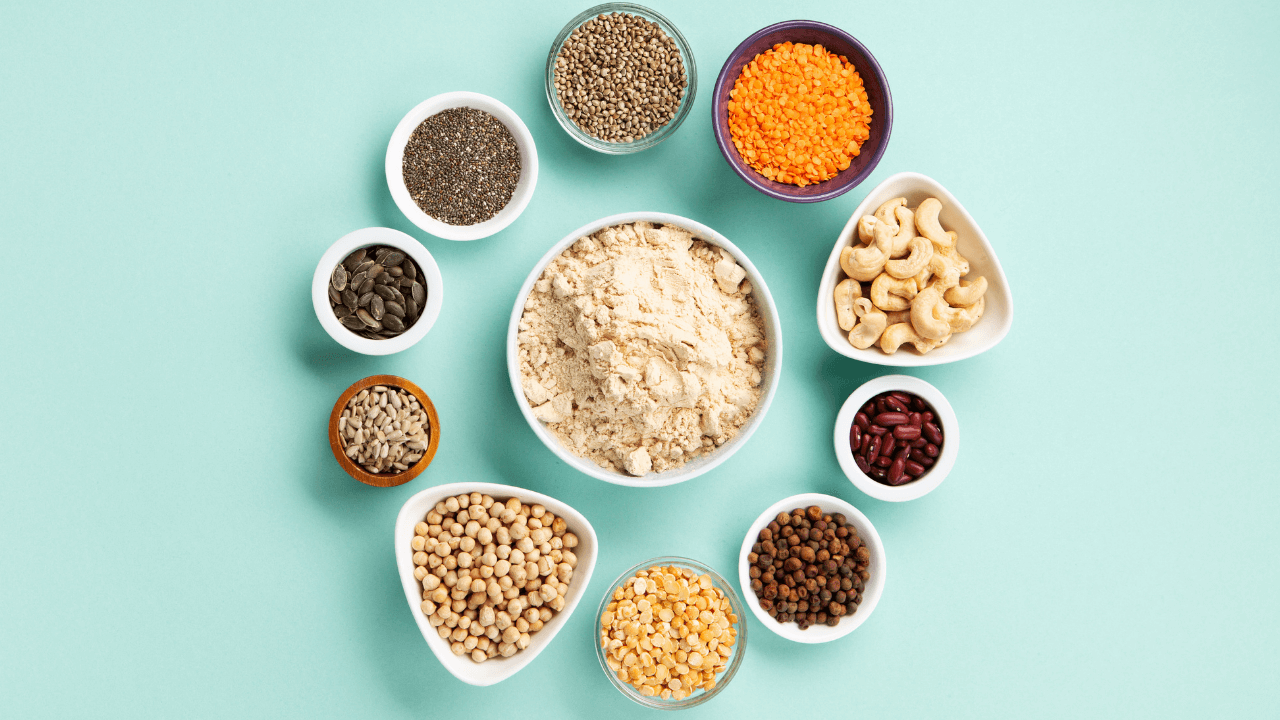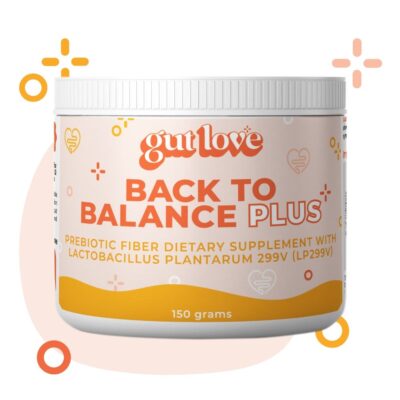Everywhere you scroll SOMEONE is talking about protein and it IS worth the hype! But if you’re living with Inflammatory Bowel Disease (IBD) your protein needs play a bigger role than you might think.
This leave you wondering – how much everywhere you scroll SOMEONE is talking about protein and it IS worth the hype! But if you’re living with Inflammatory Bowel Disease (IBD) your protein needs play a bigger role than you might think – especially when disease activity is high. Which might leave you wondering – how much protein do those with Crohn’s disease need?
Whether you are in a flare or remission protein can play a role in healing, symptom management, and immune function. In this blog we’ll break down why protein matters for Crohn’s Disease, what a day of adequate protein looks like in a flare and in remission, helpful tips to get started, and how much protein do those with Crohn’s Disease need?
How much protein do those with Crohn’s Disease need?
Why is protein important for Crohn’s Disease?
Protein isn’t just about building muscle—it’s a critical part of healing, immunity, and strength, especially if you have IBD.
Because of Crohn’s inflammatory nature, your body may:
- Need more protein to repair tissue and fight inflammation
- Lose protein due to intestinal damage or poor absorption
- Break down muscle faster, especially during flares or when taking medications like corticosteroids (e.g. prednisone)
This makes you more at risk of protein-energy malnutrition, where your body isn’t getting or using enough protein—even if you’re eating. Over time, this can lead to sarcopenia (muscle wasting), weakness, and fatigue.
Adequate protein supports:
- Muscle preservation
- Immune function
- Wound healing
- Energy and recovery during flares
We go deeper into this topic—including unconventional protein sources—in our blog and in the Youtube video below!
How much protein do those with Crohn’s need?
Individuals with Crohn’s disease often require a higher protein intake for several reasons including malabsorption, malnutrition, increased need for healing (due to inflammation and ulcerations), fluid balance and immune support.
Malabsorption in Crohn’s
Crohn’s disease can cause inflammation and damage to the small intestine, impairing the body’s ability to absorb nutrients effectively. Consequently, higher protein consumption may be necessary to compensate for the reduced absorption.
Muscle Wasting & Malnutrition in Crohn’s
Chronic inflammation, reduced appetite, and malabsorption can contribute to muscle wasting and weight loss in people with Crohn’s disease. Increasing protein intake may help preserve muscle mass and support overall health.
Also, it’s important to note that not everyone with Crohn’s experiences weight loss. However, even without weight loss you can still be malnourished.
Wound Healing & Repair
Crohn’s disease can cause lesions and ulcerations in the digestive tract. Protein plays a crucial role in tissue repair and regeneration, making it vital for healing these wounds.
Fluid balance Support
Protein aids in maintaining fluid balance in the body. People with Crohn’s disease often experience diarrhea and fluid loss, so consuming adequate protein can help prevent dehydration and electrolyte imbalances.
Protein helps with Immune support
Protein is essential for maintaining a robust immune system, which can be compromised in individuals with Crohn’s disease due to inflammation and malnutrition. Ensuring sufficient protein intake can help support immune function.
Individuals with Crohn’s disease may benefit from a higher protein intake to offset malabsorption, prevent muscle wasting, promote wound healing, maintain fluid balance, and support immune function. Consulting a healthcare professional or registered dietitian (like us!) can help determine the appropriate protein intake based on individual needs and disease severity.
Protein needs may also vary depending on:
- Current symptoms (flare vs. remission)
- An individual’s goals
- Age and stage of life
- Weight
- Activity levels
General Protein Guidelines for Someone with Crohn’s:
Remission: 1-1.2 grams protein per kg body weight
Flare: ~1.5 grams protein per kg body weight
To calculate your weight in kilograms:
Weight in pounds ÷ 2.2
Example:
150 lbs ÷ 2.2 = ~68 kg
Remission: 68–80 g protein/day – round to 70-80 g protein/day
Flare: ~100 g protein/day
What does a day of optimal protein look like?
The meal ideas below are a helpful way in which one can break down a day of protein when in remission and flare for a 150 pound person.
Sample Meal Day with ~70-80 grams protein (Remission)
- Breakfast: ½ cup oatmeal with 1 Tbsp. chia seeds, maple syrup, ½ cup blueberries, and ¾ cup almond milk
- Lunch: 1 ½ cups red lentil soup with carrots and zucchini
- Supper: 3 ounces salmon, with 1-2 cups steamed broccoli, and ½ cup rice
- Snack: OWYN Protein Drink
Sample Meal Day with ~100 grams protein (Flare)
- Breakfast: Smoothie with ½ block silken tofu, 1 banana, 1 tsp. Ground flax, 1 handful spinach, 1 cup soy milk, 1 Tbsp. cacao powder
- Lunch: Canned sardines with ¼ cup hummus and Simple Mills Crackers
- Snack: Go Macro Bar and fruit of choice
- Supper: 4 oz. cod with ½ cup sweet potato and 1 cup squash
- Snack: OWYN Protein Drink
As important as protein is for IBD, we can’t underestimate the importance of eating carbohydrates, fats, and fiber for IBD as well. We discuss the importance of fiber for IBD in this blog.
Frequently Asked Questions About Protein
What are signs of low protein?
If you suspect you have a protein deficiency, it’s essential to be aware of the common symptoms, such as swelling (edema), hair loss, brittle nails, reduced muscle strength, muscle mass loss, and slower recovery from wounds.
If you are experiencing these symptoms or are concerned about your protein intake, consult a healthcare professional. They can evaluate your diet and provide tailored guidance on how to increase your protein consumption, ensuring you receive the necessary nutrients for overall health and well-being.
Can you get enough protein from plant-based sources?
Obtaining sufficient protein from plant-based sources is entirely achievable by incorporating a variety of protein-rich foods into your diet. You might be surprised how small swaps and upgrades can get you a lot closer to your protein goals!
Excellent sources of plant-based protein include legumes such as lentils, chickpeas, and beans; whole grains like quinoa, buckwheat, and brown rice; nuts and seeds such as almonds, walnuts, pumpkin seeds, sacha inchi seed and chia seeds; as well as soy products like tofu, tempeh, and edamame.
To ensure you consume enough protein, consider balancing your meals by combining different plant-based protein sources, for example, pairing whole grain bread with nut butter, adding legumes to a rice dish, or creating a mixed vegetable and tofu stir-fry.
Additionally, using plant-based protein powders made from sources like pea, hemp, or brown rice can be a convenient way to supplement your protein intake, particularly for those with increased requirements, such as athletes or individuals following a highly active lifestyle.
By being mindful of dietary choices and selecting from the wide array of protein-rich plant-based foods available, you can easily achieve an adequate protein intake without relying on animal-based sources.
Can Protein help Bone Health?
There is a myth that protein is detrimental to bone health- it’s not. Numerous studies have shown that protein, offers significant benefits for maintaining strong bones. The misconception is based on the notion that protein heightens the body’s acid load, causing calcium to leach from bones to counteract the acidity.
Recent research suggests that protein intake, is advantageous for bone health. For example, a 2022 review involving 1,570 participants aged 68 to 75 years revealed that higher protein consumption had a substantial impact on improving bone density.
Furthermore, studies indicate that combining protein intake with resistance training becomes increasingly important as we age as we tend to loose muscle mass with aging. This combination may contribute to preserving bone mass, reducing the likelihood of osteoporosis and bone fractures.
This knowledge is particularly vital for individuals undergoing menopause or those managing periods of low intake or malnutrition (common in IBD IBD), as these groups may be at a higher risk of developing bone-related health issues. Adequate protein intake, alongside regular exercise, can help promote bone health and maintain overall well-being throughout life.
Why is protein important?
Protein is an essential macronutrient that plays a crucial role in various bodily functions. It serves as a building block for tissues, muscles, skin, hair, and nails, and is also responsible for producing enzymes, hormones, and antibodies. The body cannot store protein, which is why it is important to consume a sufficient amount every day.
Protein aids in weight management, promotes muscle growth and repair, boosts metabolism, stabilizes blood sugar levels, and supports immune function. Thus, incorporating adequate protein into a well-balanced diet is vital for maintaining overall health and well-being.
Does protein help with repair and recovery?
Protein plays a critical role in the healing process following an injury by supporting the growth, renewal, and restoration of cells. As the fundamental building block of tissues and organs, protein is essential for maintaining structural integrity and function.
Moreover, protein has been shown to be a key factor in exercise recovery. Studies indicate that protein aids in muscle recovery, repair, and regrowth, ultimately promoting the development of lean muscle mass.
In essence, consuming adequate protein not only assists in injury rehabilitation but also contributes to enhanced exercise recovery, fostering overall strength and well-being.
How does protein impact the immune system?
Protein plays a critical role in the immune system, which is responsible for defending the body against infections, diseases, and foreign substances. Various components of the immune system, such as antibodies, cytokines, and immune cells, are made up of proteins.
- Antibodies: These are specialized proteins produced by the immune system in response to the presence of foreign substances, like bacteria or viruses. Antibodies bind to these invaders and help eliminate them from the body.
- Cytokines: These proteins serve as chemical messengers that facilitate communication between immune cells, regulating the immune response and inflammation.
- Immune cells: White blood cells, including B cells, T cells, and natural killer cells, are specialized immune cells that contain proteins vital for recognizing and combating pathogens.
Additionally, proteins are involved in the formation of the complement system, a group of proteins that collaborate to mark pathogens for destruction and recruit immune cells to the site of infection.
A diet rich in high-quality protein sources is crucial to support the synthesis of these immune components and maintain optimal immune function. Protein deficiency can compromise the immune system, making the body more susceptible to infections and diseases.
Final thoughts
Protein is an important part of someone’s dietary needs when in remission or flaring. Protein needs change throughout the course of one’s IBD journey as outlined above.
If you are unsure of how to meet your protein needs or are struggling to eat anything while in a flare – we can help! Book a call with the Crohn’s and Colitis Dietitians and get personalized support from experts who get it. Schedule your free call here.
Also…..
Ready for More Content like This? I got you!
If you liked this article – there is more where that came from! Our e-books and IBD nutrition library is filled with all of our most asked questions – the most recent topics included have been:
- What about dairy products and also lactose intolerance? What’s the research say?
- How to best way to support bone health in IBD?
- Is low residue the way to go? How much dietary fiber do we need with IBD?
- What’s food or foods should inflammatory bowel disease patients to focus on while having active disease?
- What’s food patterns and nutrition deficiencies are associated with increased risk?
- Do single amino acids like glutamine help with IBD?
- Is there a systematic review or clinical study on probiotics in IBD patients?
- Are nutrition recommendations different for Crohn’s and Ulcerative colitis?
- What nutritional approaches are best – SCD, AIP… and how can we make it easier to get good results?
Also, if we don’t cover it in our library – you can always request it!
Hear from others:
“I just want to say that your e-books and library have changed my life! Even though I haven’t worked with you, I’ve found so much value from the content you put out here. Thank you all for the work that you are doing!” -Marissa
“I admit – I thought this was going to be more of the boring, surface level information I see everywhere online but I’m impressed. I leave all your webinars and materials feeling like a IBD scholar.” -Jonny
“I’m such a fan of your content!! I’ve been a subscriber to your library since the very beginning and have learned so much!” -Christine
“I used to feel so confused with all the conflicting information that’s online – it’s like do SCD, no do AIP… (you know how it goes) but you all do such a good job of breaking all of it down and helping me really get what matters most. It’s been like a breath of fresh air finding you!” -Marisel
References
Groenendijk I, Grootswagers P, Santoro A, Franceschi C, Bazzocchi A, Meunier N, Caille A, Malpuech-Brugere C, Bialecka-Debek A, Pietruszka B, Fairweather-Tait S, Jennings A, de Groot LCPGM. Protein intake and bone mineral density: Cross-sectional relationship and longitudinal effects in older adults. J Cachexia Sarcopenia Muscle. 2023 Feb;14(1):116-125. doi: 10.1002/jcsm.13111. Epub 2022 Nov 8. PMID: 36346154; PMCID: PMC9891984.
Wang X, Yu Z, Zhou S, Shen S, Chen W. The Effect of a Compound Protein on Wound Healing and Nutritional Status. Evid Based Complement Alternat Med. 2022 Mar 24;2022:4231516. doi: 10.1155/2022/4231516. PMID: 35368770; PMCID: PMC8970868.om experts who get it. Schedule your free call here.







0 Comments
Trackbacks/Pingbacks